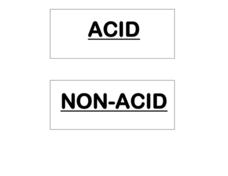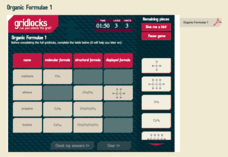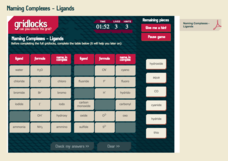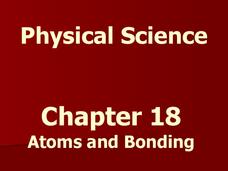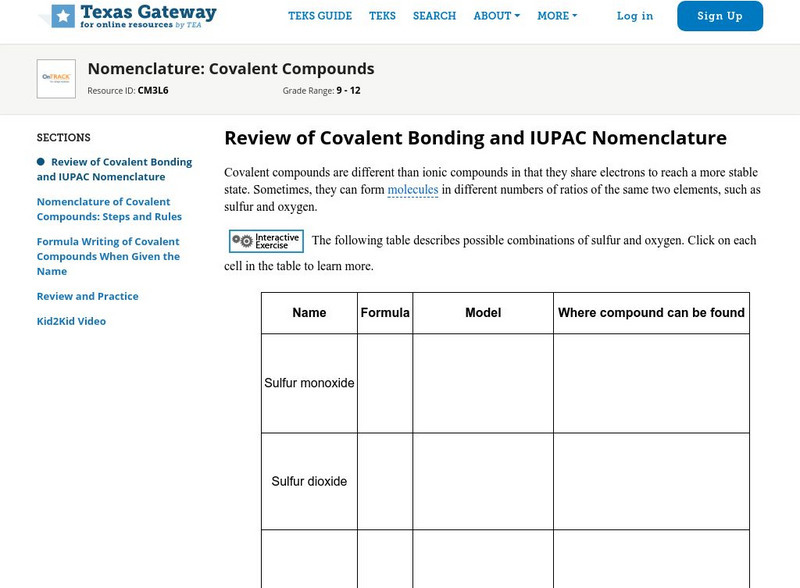National Science Teachers Association
Acid Non-Acid
Using these printable cards, chemistry fanatics can practice identifying acids by the name or by the chemical formula. The names are obvious since they all end in acid, so perhaps it would be more valuable to exclude the name cards from...
Royal Society of Chemistry
Organic Formulae 1
Puzzles are the formula for success in organic chemistry! Hydrocarbons abound in the first of two interactives involving basic organic molecules. The easy-to-use lesson is available online and in print form, so you can pick your delivery...
Royal Society of Chemistry
Naming Complexes—Ligands
Naming complexes can be, well, pretty complex! Simplify a study of ligands using interactive puzzles. Junior chemists match up the name, formula, and complex name, then solve a series of logic games with the information.
Royal Society of Chemistry
Organic Formulae 2
Is your chemistry class frustrated by the multitude of representations of organic molecules? Add some challenging puzzles to an otherwise ho-hum organic lesson and let the fun begin! The second of a two-part activity focused on basic...
Royal Society of Chemistry
Naming Esters
Do your chemistry scholars know their esters? Introduce the class to the nomenclature and structural formulas of common esters through thought-provoking games. Individuals or pairs of pupils match the name with the formula before using...
Royal Society of Chemistry
Some A-level Reagents
Learning names and formulas can be a daunting task for young chemists, so support their study with interactive puzzles! First, users match each formula with its correct name. Then, individuals use them to complete three logic games.
Royal Society of Chemistry
Compounds Ending in 'ate'
Tackle polyatomic ions with Sudoku-like games! Nomenclature novices practice identifying the names and constituents of carbonate compounds with a series of puzzles. Scholars can use the resource online or as a worksheet, thanks to the...
Royal Society of Chemistry
Organic Names—Functional Groups
Worried that your lesson plan about functional groups is dysfunctional? Liven things up with interactive puzzles! Curious chemists arrange functional groups based on name, formula, suffix, and an example. The challenge begins when the...
Royal Society of Chemistry
Extraction of Copper
Is copper found as a raw material? Science sleuths manipulate the reactants and products found in the copper extraction process in a series of fun puzzles. The interactive engages learners in pairing formulas with their names while using...
Teach Learn Chem
Ions in Chemical Compounds
In this ions activity, students complete a table by combining the given ions in different combinations to make a neutrally charged chemical compound.
Spark Notes
Review of Chemical Bonding: Review Test
This is an online exercise in which chemistry learners answer a series of multiple choice questions about bonding. Topics addressed include ionic and covalent bonds, electronegativity, ions, valence electrons, resonance structure, and...
Royal Society of Chemistry
Common Compounds
Can your young chemists identify the most commonly used chemicals in the lab? Introduce the class to the go-to substances in most middle and high school chemistry experiments with an interactive. The resource offers timely feedback as...
Royal Society of Chemistry
Isomers of (E)-but-2-ene
One chemical formula—but how many different structures? Familiarize young chemists with the concept of isomers through simple, related games. Users identify each isomer base upon its name, structure, and type of isomerization in a set of...
National Science Teachers Association
Ionic Molecular
Twelve compounds are named and each of their chemical formulas are printed on individual cards. Chemistry pupils place each beneath an Ionic or Molecular card, depending on which type of compound is represented.
National Science Teachers Association
Oxyacid Non-Oxyacid
What you will find in this printable document is a set of cards. One says oxyacid and the other says non-oxyacid. The remaining cards are of the names or chemical formulas of 10 acids. Chemistry classes can sort the cards according to...
National Science Teachers Association
Metals Metalloids Nonmetals
When physical science classes are becoming familiar with the periodic table of elements, you can use this set of printable cards to help them memorize some of the members of the metals, metalloids, and nonmetals groups. There are 24...
National Science Teachers Association
Monovalent Polyvalent
Which compounds have only one valence bond, and which have two? Chemistry classes sort cards into groups of monovalent and polyvalent piles, according to their bonds. There are 20 cards to identify; half of them name the compound, while...
National Science Teachers Association
Binary Ternary
This is a simple activity to help chemists become adept at recognizing binary and ternary compounds. All they have to do is place the compound card (some are named and some are represented by chemical formula) beneath the correct...
Mr. E. Science
Atoms and Bonding
I don't trust atoms because they make up everything. Budding scientists learn about famous scientists connected to atomic models, chemical, ionic, and hydrogen bonds. The presentation also presents how to count atoms...
Royal Society of Chemistry
Testing for Gases
If most gases are invisible, how do we know so much about them? Pupils practice associating the name, formula, testing method, and outcome for four common gases using an interactive. Users build on the content of their first puzzles to...
Royal Society of Chemistry
Elements 1
The periodic table can be a little overwhelming to young scientists. Meet your class' worries head on by introducing the table in a game. Individuals test their knowledge of the names and symbols of common elements, then use deductive...
Pingry School
Heat of Reaction and Hess's Law
Melting and burning might seem like opposites, but both exist as common examples of exothermic reactions. Scholars work with three different exothermic chemical reactions to determine the enthalpy changes. They measure and mix chemicals,...
Texas Instruments
Texas Instruments: Naming Chemical Formulas
This Study Card stack will provide additional review for naming chemical compounds and chemical formulas.
Texas Education Agency
Texas Gateway: Nomenclature: Covalent Compounds
Given descriptions, diagrams, or scenarios, students will write and name the chemical formulas of binary covalent compounds.
